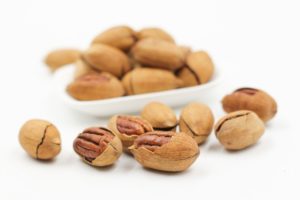Fans of peanuts, walnuts and tree nuts have something to be excited about. People who eat nuts regularly have a lower risk of developing cardiovascular or coronary heart disease than those who don’t, according to a study published recently in the Journal of the American College of Cardiology. It is currently the largest study ever to test how nut consumption relates to the incidence of cardiovascular disease.

Credit: ohnuts.com
Researchers followed over 210,000 people, with follow-up periods of up to 32 years. Participants’ medical history, lifestyle and health conditions were gathered through self-administered questionnaires every two years.
Studies in the past looked at nut consumption in relation to heart health, but most focused on overall nut intake. For this study, researchers also looked at how specific types of nuts — peanut butter, peanuts, walnuts and tree nuts — influenced the occurrence of major cardiovascular events. (Peanuts were included in the study even though they are technically a legume. They have a similar nutrient profile as other nuts.)
For instance, participants who ate walnuts one or more times per week had a 19 percent lower risk of cardiovascular disease and 21 percent lower risk of coronary heart disease. If a person ate peanuts two or more times per week, their risk of cardiovascular disease dropped 13 percent, and their risk of coronary heart disease dropped 15 percent. Those who ate tree nuts two or more times per week had a 15 percent lower risk of cardiovascular disease and 23 percent lower risk of coronary heart disease.
People who ate five or more servings of nuts per week had a 14 percent reduced risk of cardiovascular disease and a 20 percent reduced risk of coronary heart disease compared to participants who never or almost never ate nuts. Researchers found similar risk reduction for participants who ate tree nuts, walnuts and peanuts individually.
Researchers also looked at how nut consumption affects a person’s risk of stroke. They found no association between total nut intake and stroke risk. However, they did find that eating peanuts and walnuts correlated with an increased stroke risk. Tree nuts and peanut butter posed no risk of stroke.
“Our findings support recommendations of increasing the intake of a variety of nuts, as part of healthy dietary patterns, to reduce the risk of chronic disease in the general populations,” said Marta Guasch-Ferre, PhD. She is the lead author of the study and a research fellow at the department of nutrition at Harvard T.H. Chan School of Public Health.
Study Limitations
The researchers clearly listed several limitations of the study. For instance, the sample consisted only of white healthcare professionals. They noted, however, that results may be generalized across ethnicities because there’s no reason for the “underlying mechanisms” to be different.
 Some errors were also possible because participants self-reported their nut consumption. Also, the researchers did not collect data about how the nuts were prepared.
Some errors were also possible because participants self-reported their nut consumption. Also, the researchers did not collect data about how the nuts were prepared.
Nevertheless, Emilio Ros, M.D., Ph.D.,of the Endocrinology and Nutrition service at the Hospital Clinic in Barcelona, Spain confirmed via an accompanying editorial that the findings seemed to link nut consumption and heart disease protection.
Ros called for more studies , but noted that he considers raw nuts “natural health capsules” that are part of a heart-friendly diet and may facilitate healthy aging.

 Eating Variety of Nuts Linked to Reduced Risk of Cardiovascular Disease
Eating Variety of Nuts Linked to Reduced Risk of Cardiovascular Disease


 Having an Estate Plan Is Essential – So Is Discussing It With Your Children
Having an Estate Plan Is Essential – So Is Discussing It With Your Children
 The Healing Sound of Singing Bowls
The Healing Sound of Singing Bowls
 “Summons” by Aurora Levins Morales
“Summons” by Aurora Levins Morales














